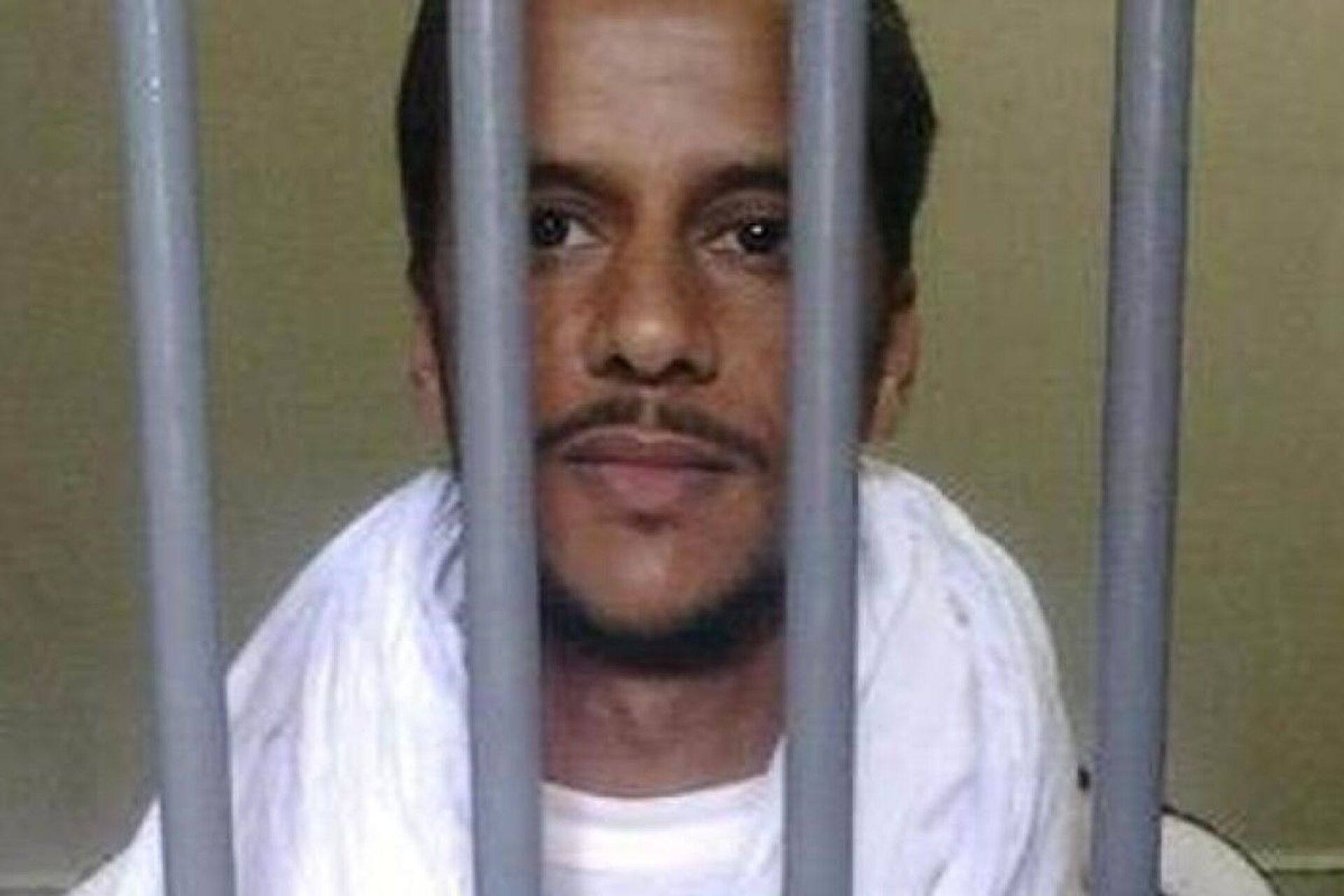‘News Black Hole’: A Year of War Shows Why UN Needs to Monitor Human Rights in Western Sahara
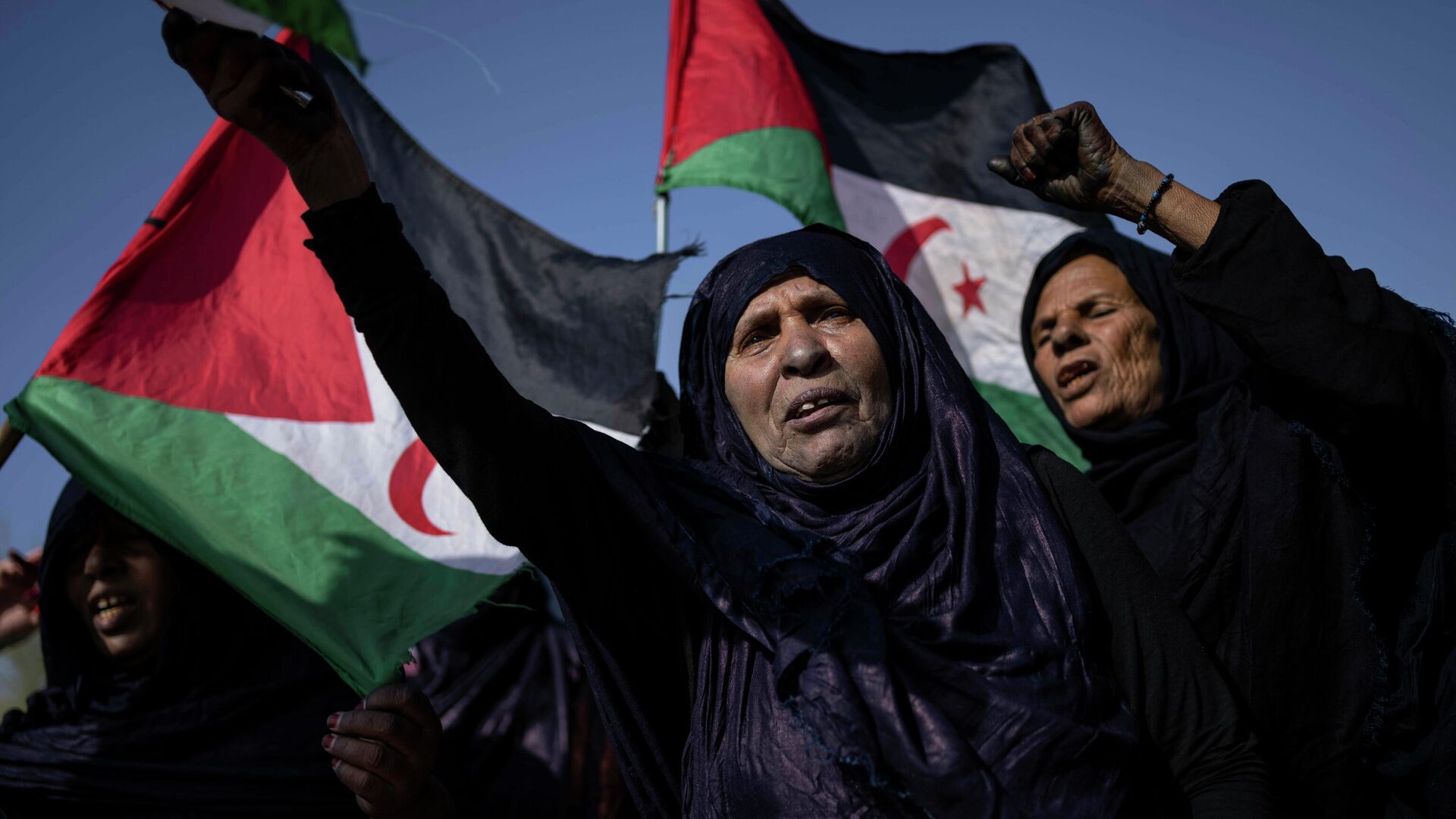
© AP Photo / Bernat Armangue
Subscribe
It’s been one year since two titanic events shook Western Sahara: the renewal of war with Morocco after 29 years of peace and recognition of Morocco’s claim to rule the territory by the United States. Saharawi activists and leaders say it’s made the human rights situation more dire than ever, emphasising the United Nations’ need to monitor them.
On November 13, 2020, the Popular Front for the Liberation of Saguia el-Hamra and Río de Oro (POLISARIO) declared an end to the ceasefire that had kept the peace in Western Sahara for 29 years after Moroccan troops forced a civilian protest at the southern Guerguerat border crossing to disperse. The crossing is located in a narrow neutral strip of land monitored by the UN Mission for the Referendum in Western Sahara (MINURSO), and had been shut down for weeks as protesters objected to what they said would aid in the extraction of the desert land’s resources against the will of the Saharawi people.
Less than a month later, on December 10, then-US President Donald Trump announced US recognition of Morocco’s claim to rule Western Sahara, which the monarchy calls its southern territory. The move, which bucked decades of US foreign policy as well as UN resolutions, helped facilitate Morocco’s addition to the Abraham Accords and its normalization and formalization of long-underground ties with Israel, as Bahrain, the United Arab Emirates, and Sudan had done earlier that year.
In the year since, activists in Western Sahara have documented a precipitous decline in respect for human rights, a trend largely unknown outside the territory due to what Reporters Without Borders have called a “news black hole,” where Moroccan authorities have placed severe restrictions upon the access of journalists and human rights monitors.
Several Saharawi activists who spoke with Sputnik said this trend highlights the need for MINURSO to add a human rights monitoring component - something the peacekeeping mission uniquely lacks - and that the UN must work hard to earn the trust of the Saharawi people if it expects them to lay down their arms and return to a negotiating table that for 29 years has failed to yield a promised independence referendum.
UN Has ‘Become Part of the Problem’
“The people of Western Sahara lost their trust in the UN a very long time ago, so the UN must work very hard to regain that trust,” Omeima Abdeslam, Polisario’s representative in Geneva, Switzerland, told Sputnik.
“What has happened in Western Sahara and the year of hostilities is that the UN and the Secretary General have been pushed to work on the peace process seriously,” she said. “They have seen that the Saharawi people are not kidding when they say that the armed struggle is the path to gain the independence
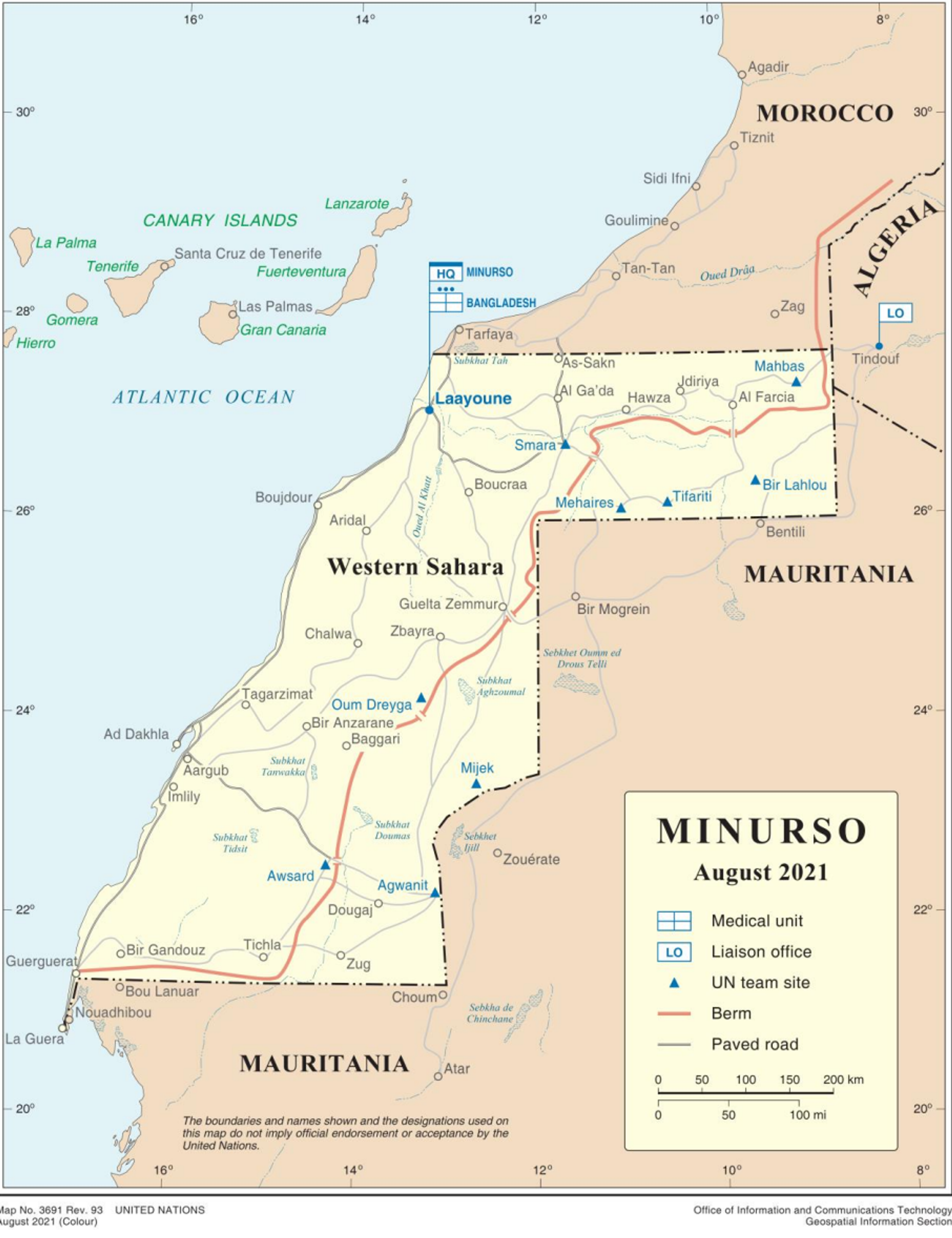
A map of Western Sahara from August 2021, showing the sand berm built by Morocco and sites used by the UN Mission for the Referendum in Western Sahara (MINURSO)
© MINURSO
“They have noticed that the UN and the Security Council are no longer credible partners to achieve peace in Western Sahara and have become part of the problem by blocking implementation of the annual resolutions calling for the right of Saharawi people to self-determination.”
Abdeslam hailed a decision by the European Union Court of Justice last month that struck down an EU-Morocco trade deal because it didn’t have the consent of the Saharawi people to extract resources from Western Sahara, in particular its rich fisheries, which form much of the EU fishing fleet’s haul. The ruling specifically noted that Polisario is the legitimate representative of the Saharawi people.
“This decision and the others that have come before very clearly unmask all those countries and companies who have been profiting in a very unethical way from the natural resources of the people of Western Sahara without their consent and the consent of their leadership the Polisario Front,” she said. “Now any company or countries who are making any deal in Western Sahara with the Moroccan occupiers are just thieves, and the Polisario Front will bring them to justice to pay for the damage that they are doing to the Saharawi people.”
The decision could impact a major part of Morocco’s much-touted green energy transition: a program to build extensive wind farms along the Western Saharan coast. Rabat has pledged to source 50% of its energy needs from renewable sources by 2030, but Western Sahara Research Watch noted in a report published on Monday that 47.2% of Morocco’s wind power and 32.64% of its solar power could come from Western Sahara by then - something the group called “greenwashing occupation.” Last month, US-based General Electric became the latest corporation to invest in the project.
Abdeslam further noted that Polisario has made many calls to “boycott products and companies that are coming or working in Western Sahara in coordination with the Moroccan regime,” highlighting the historical effectiveness of peaceful boycotts, including those against Apartheid South Africa and the Boycott, Divestment and Sanctions (BDS) movement against Israel that was initiated by Palestinian activists.
MINURSO Must Track Human Rights
Activists inside and outside of Western Sahara have long pointed to the absence of a human rights monitoring instrument in MINURSO as effectively giving a free hand to Moroccan police.
Ambassador Sidi Omar, who represents Polisario at the United Nations in New York, told Sputnik that the November 2020 violation of the ceasefire was “a very serious and unprecedented development that the Security Council should address as a matter of urgency in its upcoming discussions on MINURSO,” scheduled for Wednesday, October 27.
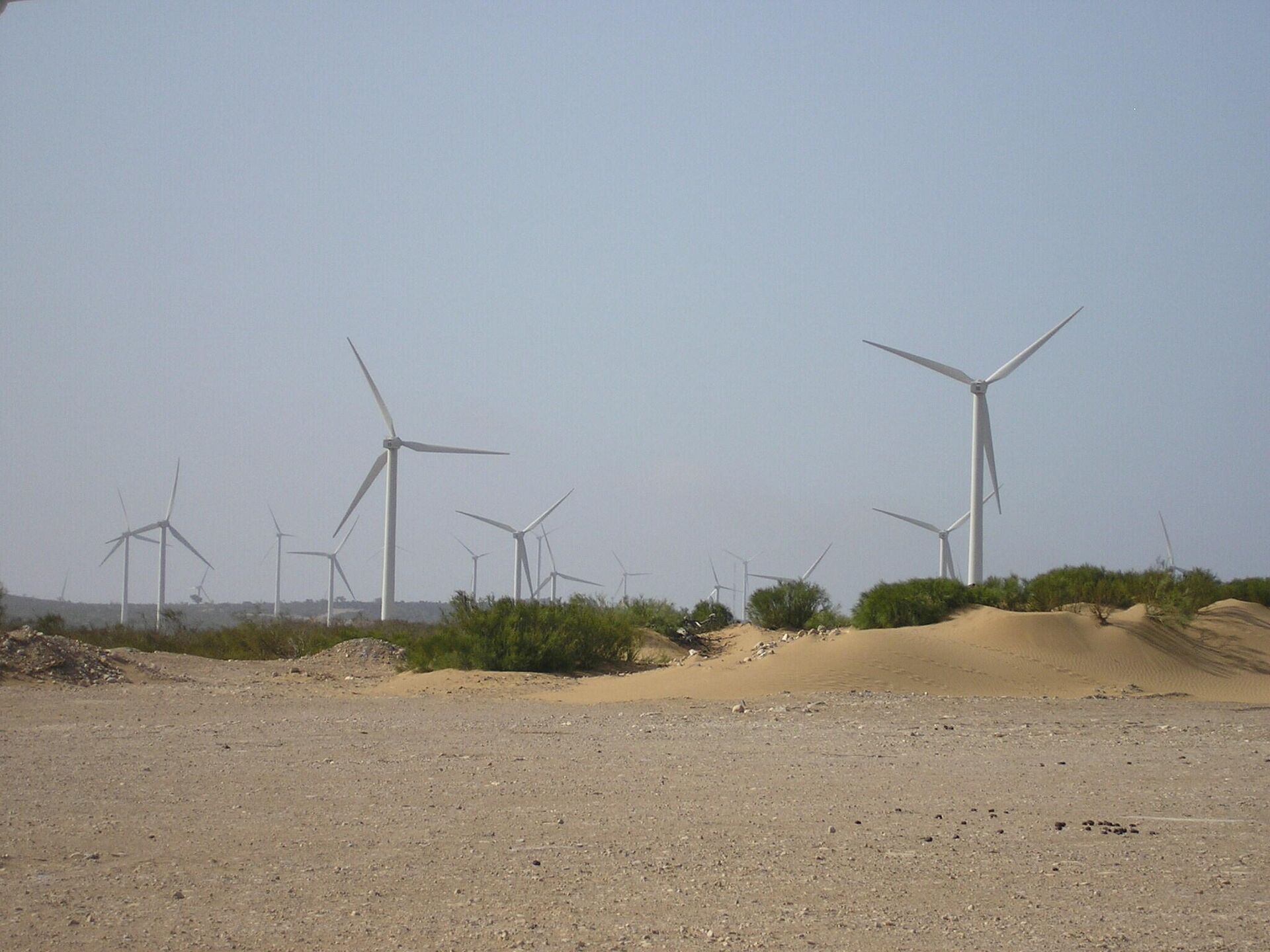
Amogdoul Wind Farm in Essaouira, Morocco
© Flickr / sqala
Criticizing what he called a “hands-off approach” by the UNSC, Omar urged them to “introduce and agree on substantive changes in its upcoming resolution on Western Sahara to deal seriously with the new situation on the ground,” including “provid[ing] MINURSO with the necessary mandate and operational capacity to monitor and report on the human rights situation in the Territory.”
Although the Biden administration has pledged to remain actively engaged on the Western Sahara issue, it still hasn’t reversed Trump’s declaration of support for Morocco’s claims. Omar said if this situation continues, it “will not only cast doubt on US’ neutrality vis-à-vis the question of Western Sahara. It will also raise the question of whether the United States could continue to play a constructive and credible role in the UN peace process.”
“The keys to resolving the issue of Western Sahara lie in the hands of the Security Council and the pressure it is willing to bring to bear on Morocco to allow the self-determination referendum to take place as mutually agreed,” Omar said, adding that Morocco “has no political will to resolve the conflict” and prefers “continued irresolution,” gambling that “with time it could ‘normalise’ its illegal occupation of parts of Western Sahara and make its illegal annexation ‘irreversible.’”
Thus, without US leadership at the UN pushing for a lasting peace, which includes MINURSO’s independence referendum, the war will continue and the situation will continue to worsen.
Omar isn’t alone in arguing this, though: since Trump’s declaration, numerous veteran US diplomats have criticized the decision, including Trump’s former national security adviser John Bolton and a former secretary of state, James Baker, who called it “an astounding retreat from the principles of international law and diplomacy” that would destabilize a region where al-Qaeda* and Daesh* are making dangerous inroads.
Earlier this month, 10 US senators signed a letter to US Secretary of State Antony Blinken urging him to “prioritize engagement with the Moroccan government about human rights abuses, including calling for the release of political detainees and an end to the harassment and threats against critics of the Moroccan government.”
“We urge you to increase the Department’s focus on human rights abuses against Sahrawi activists in Western Sahara and Morocco by including a mandate to monitor human rights and ensuring the right for self-determination is maintained in the renewal of the United Nations Mission for the Referendum in Western Sahara (MINURSO) at the end of this month,” the senators wrote.
‘An Imperious Matter’: Monitoring Human Rights
Mahjoub Maleiha, head of external relations for the Collective of Saharawi Human Rights Defenders in Western Sahara (CODESA), told Sputnik that a UN human rights mandate is “an imperious matter” because “Western Sahara is an occupied territory under a severe military siege.”
“A UN mechanism to protect and monitor human rights is a must to keep the UN and the international community informed about what’s really happening on the ground,” he said. “The UN mission - MINURSO - must assume its responsibilities and play a role to protect human rights and assure respect of the International Humanitarian Law. In this regard, MINURSO should not only report the daily human rights violations, but also all violations of international humanitarian law, such as demographic engineering, forced allegiance, the plunder of natural resources, etc.”
While MINURSO does have limited cooperation with the Office of the UN High Commissioner for Human Rights (OHCHR), it is extremely cursory in nature. A report on the previous calendar year by UN Secretary General Antonio Guterres published on October 1 noted that the OHCHR had not made a single visit to Western Sahara in more than six years.
However, Guterres’ report noted that OHCHR is “concerned by reports” of restrictions on the freedoms of expression, peaceful assembly and association in Western Sahara, and noted that the Special Rapporteur on the situation of human rights defenders had called on Morocco in July to stop targeting human rights defenders and journalists.
“Special procedure mandate holders of the Human Rights Council sent three communications in relation to allegations of torture and ill-treatment of protestors, journalists, bloggers, lawyers and human rights defenders,” Guterres noted.
“I reiterate my call to the parties to respect, protect and promote the human rights of all people in Western Sahara, including by addressing outstanding human rights issues and enhancing cooperation with OHCHR and the United Nations human rights mechanisms, and to facilitate their monitoring missions. Independent, impartial, comprehensive and sustained monitoring of the human rights situation is necessary to ensure the protection of all people in Western Sahara,” Guterres said.
Morocco Given ‘A Green Light’
Maleiha said the US recognition had given Morocco “a green light to continue and intensify its brutality in the territory.”
“It gave them some kind of impunity guarantees. Human rights defenders and journalists became easy targets,” he said.
CODESA has compiled extensive documentation to back up its claims. At a September forum titled “No Sahrawi Left Behind,” Maleiha enumerated some of their findings, which include 2 cases of killing; a miscarriage caused by an attack by Moroccan authorities; 2 cases of rape; 93 cases of kidnapping and torture; more than 200 cases of arbitrary detention; and 90 cases of house arrest or sieges. He noted that precise numbers are difficult, due to fears of reporting and being re-targeted by the authorities.
He also noted there are 48 political prisoners who are detained in Moroccan prisons outside Western Sahara, which he said is a violation of international law.
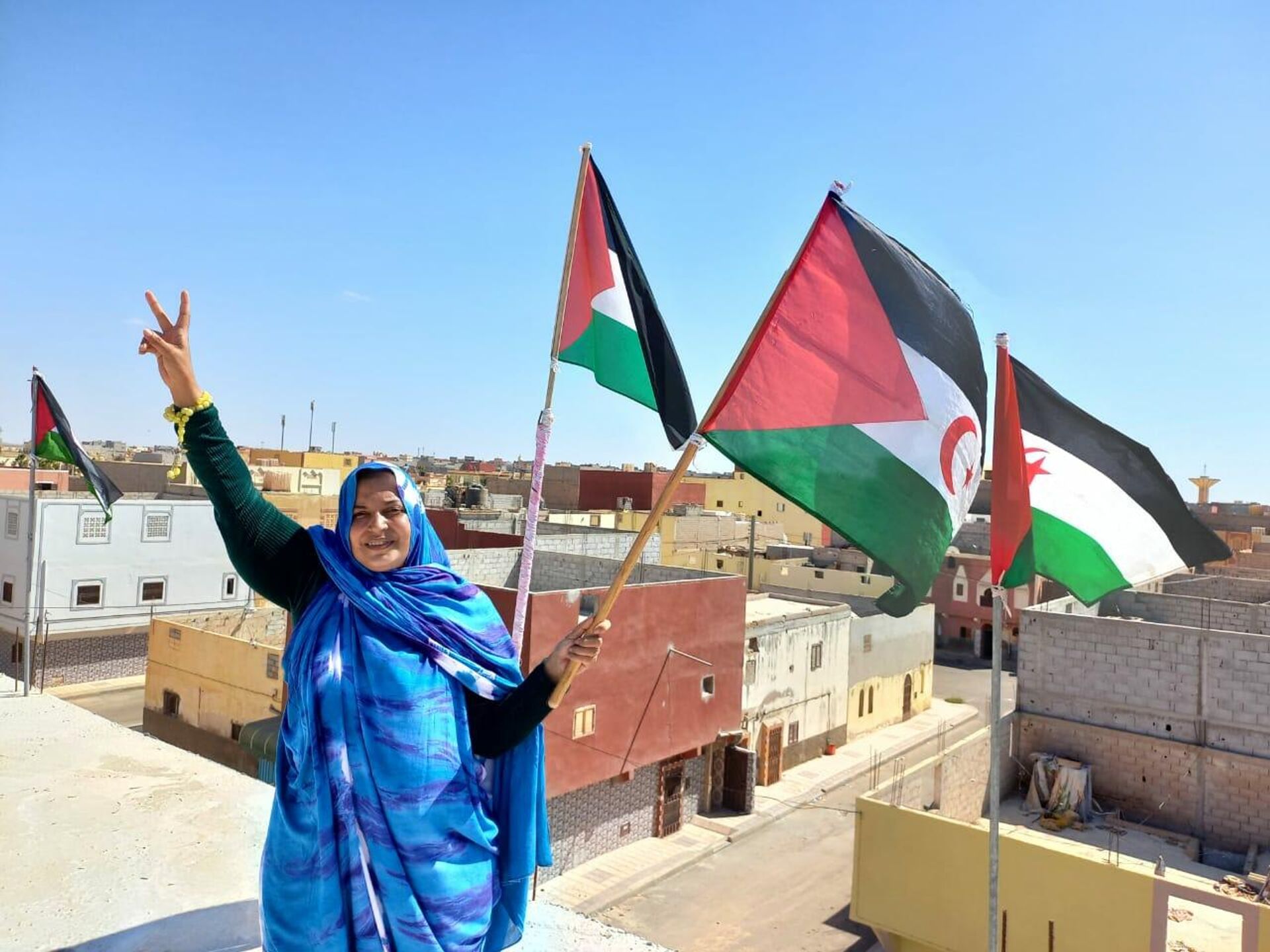
Sultana Khayya, President of the Sahrawi Association for the Defense of Human Rights and the Protection of Natural Resources, on the roof of her home in Boujdour, Western Sahara, where she has been under house arrest since November 2020.
© Sultana Khayya
Hassanna Abba, vice president of the League for the Protection of Saharawi Political Prisoners Held Within Moroccan Jails, said at the forum that prisoners are denied all normal amenities, including visits and education, and that Covid had “doubled” their suffering by ending visitation rights and due to the confiscation of property sent by their families.
He said that Saharawi prisoners have conducted 26 hunger strikes in the last year, most of which were 24-hour or 48-hour strikes, but also including a 69-day hunger strike by journalist Mohamed Lamine Haddi. Haddi has been held in Tiflet-II prison since 2010 after he was arrested and accused of terrorism for reporting on the dispersal of the Gdeim Izik student protest camp by Moroccan police. He is sentenced to 25 years.
Abba also described arbitrary detention as a strategy designed to “put an end to peaceful resistance in the territory.”
Other journalists have faced similar repression for reporting on protests. Nazha El-Khalidi, a reporter for Equipe Media, was arrested in 2016 and again in 2018. She said at the September forum that Morocco had instituted “a total media blockade on the territory by turning back all the foreign press that are trying to visit the territory.”
El-Khalidi described the situation of Sultana Khayya, a long time Saharawi human rights activist who has been under house arrest for a year, with electricity and water cut. The journalist said Khayya had been tortured and raped by police, who also gave her COVID-19. She has previously suffered severe eye damage due to beatings by police.
